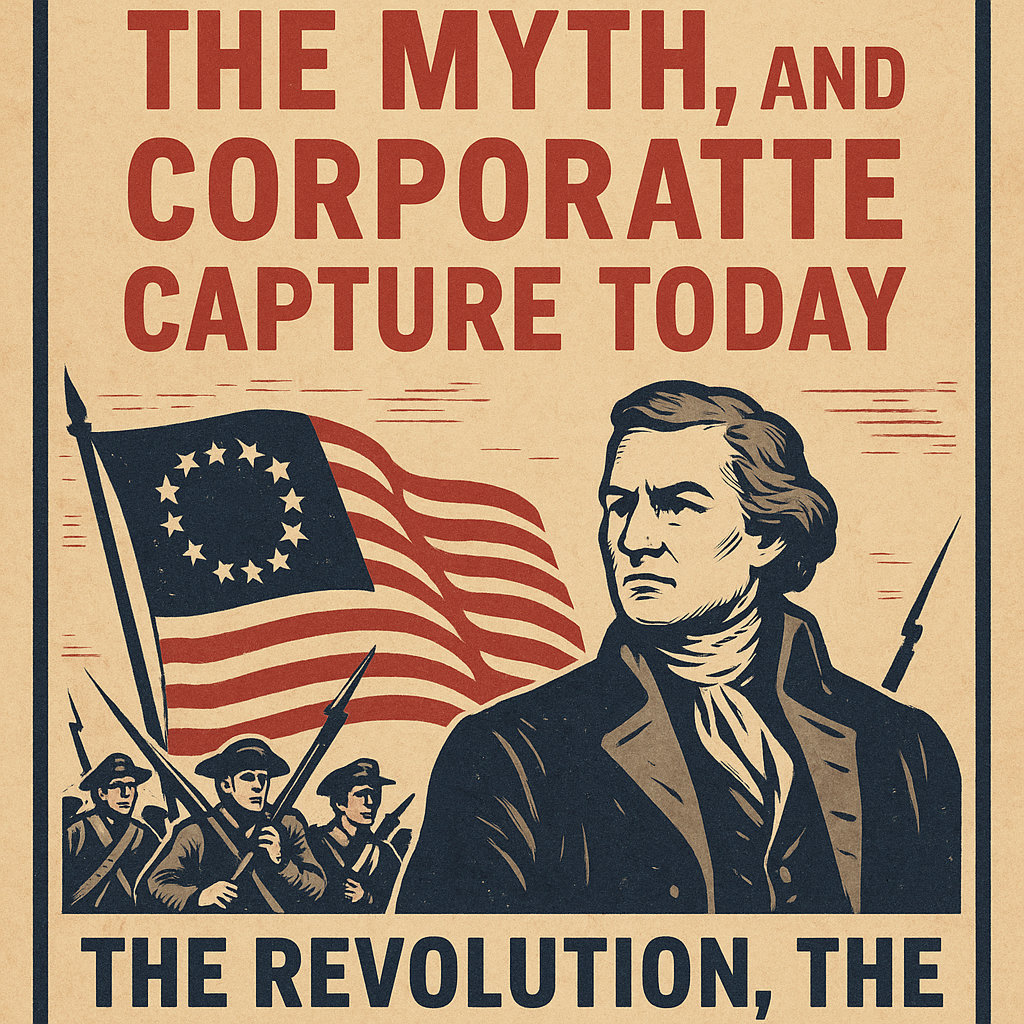
Campaign design team
The Revolution, the Myth, and Corporate Capture Today
By Vincent Cordova
Inspired by: Mell – TikTok Video
Introduction – The Myth We Were Taught
Most of us learned a simplified story about the American Revolution: a heroic uprising where colonists stood shoulder to shoulder for freedom. That myth shaped generations, but the truth was layered. Everyday people fought, sacrificed, and hoped for liberty. At the same time, wealthy colonial elites—landowners, merchants, and politicians—pushed for independence to expand their power without British oversight. Two realities coexisted: genuine ideals and calculated interests.
Today we confront a similar crossroads. Corporate elites drape themselves in words like “innovation,” “efficiency,” and “free markets” while consolidating power. Ordinary families shoulder the consequences, just as farmers, sailors, and tradespeople did in the 1770s.
The Revolution as a Dual Story
The Revolution wore two faces then, just as power does now.
- The Face of Ideas: Ordinary colonists embraced the promise of liberty, self-rule, and resistance to corruption. These ideals were real, and they inspired courage.
- The Face of Power: Wealthy elites saw independence as a path to protect slavery, expand westward, and keep British taxes and trade restrictions from limiting their fortunes.
Both stories are true. Ideals moved the people, but power structured the outcome.
Echoes in Today’s Corporate Capture
The playbook has been updated, not rewritten. Nearly 250 years later, modern elites speak the language of progress while extracting value from the public.
- Tech giants control our modern pamphlets—social platforms that decide what we see and say, guided by profit, not the public good.
- Private equity firms buy housing, healthcare, and retail, stripping wealth from communities just as colonial speculators extracted from farmers and laborers.
- Institutional investors like BlackRock and Vanguard steer corporate boards and concentrate decision-making in fewer hands.
“Free market” language has become the new “liberty”—a rallying cry that masks whose interests are truly being served.
Mechanisms of Control – Then and Now
The tools evolved, but the structure of control remains hauntingly familiar.
| 1770s Colonial Elites | 2020s Corporate Elites |
|---|---|
| Tax laws and trade restrictions that enriched the few | Lobbying and campaign spending that rewrite regulations |
| Land monopolies and speculation | Private equity buying housing, farmland, and infrastructure |
| Control over militia service and local courts | Control over wages, benefits, and algorithmic labor markets |
The Cost to Ordinary People
Then, it was poor farmers and sailors who bore war debts and taxation. Today, working families battle rising rents, stagnant wages, medical debt, and student loans. The burden still falls on those with the least power, while wealth flows upward.
Breaking the Cycle
History shows that when ordinary people organized, they expanded suffrage, wrote new constitutions, and planted the seeds of abolition. We must channel that same spirit—not to defend corporate dominance, but to dismantle it.
- Break up monopolies and enforce antitrust laws.
- Democratize corporate governance with worker and community ownership.
- Expose hidden influence with full transparency on lobbying and campaign money.
- Build public alternatives in essentials like banking, utilities, housing, and healthcare.
- Close the revolving door between regulators and corporate boardrooms.
These reforms deliver real power to the public, not myths about power.
A Government That Looked Away
Decline does not happen by accident; it happens when guardians of the public trust side with elites. Congress, regulators, and executive agencies allowed corporations to hollow out housing, healthcare, food, and education. They passed loopholes for private equity, sheltered monopolies with weak antitrust enforcement, and traded integrity for campaign checks and future board seats.
Those choices were acts of self-preservation. But history judges leaders who sell out their people. No family name or fortune survives an awakened public demanding accountability.
The Real Danger — and Why It Won’t Work This Time
The Revolution was about more than escaping a king; it was about dismantling a system that kept ordinary people dependent while elites extracted wealth. Today, the crown sits in private equity portfolios and institutional funds controlling trillions. They aim to own everything that matters—housing, healthcare, energy, media, even our data.
This is the most dangerous form of power: unelected, faceless, and unaccountable. They move money across borders faster than laws can react, hiding behind shell companies and complexity. Yet awareness is spreading. Technology and investigative reporting expose ownership structures. Community movements are demanding limits on corporate power and building nonprofit alternatives.
The crown changed hands, but the people now see the playbook—and we refuse to reenact it.
We Don’t Need Myths — We Need Rules
The next revolution will be fought with laws, unity, and courage. To protect our future, we must rewrite the rules of ownership and influence.
- Ban private equity from owning essentials like housing, healthcare, and food.
- Cap institutional holdings that strangle competition and silence local enterprise.
- Build nonprofit and public alternatives that put communities first.
- Demand full transparency so every American knows who controls their future.
The first Revolution broke the power of a crown. This generation must break financial monopolies. We do not need comforting myths—we need accountable systems that serve people. Awareness is our spark. Action will be our victory.